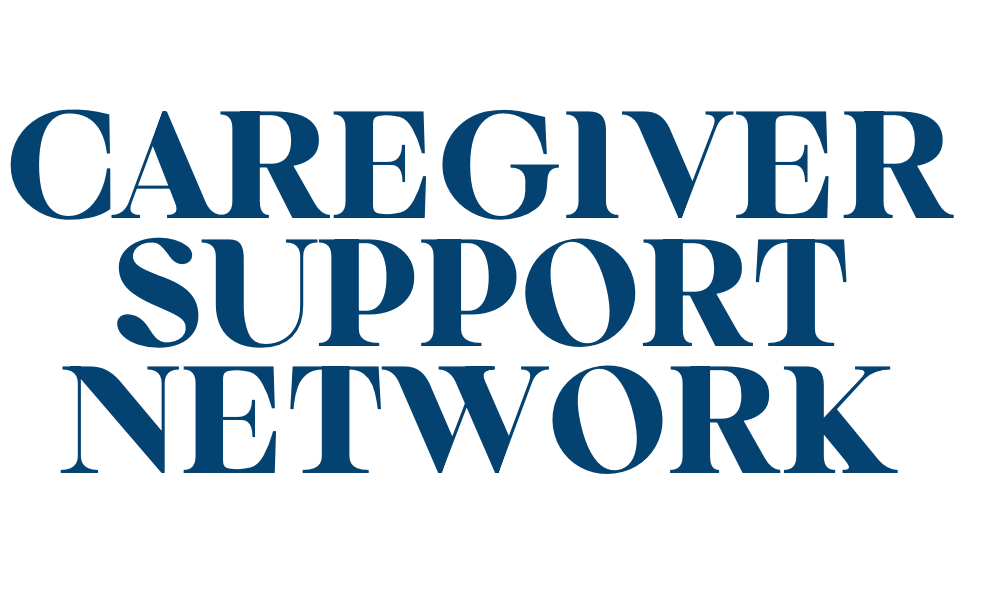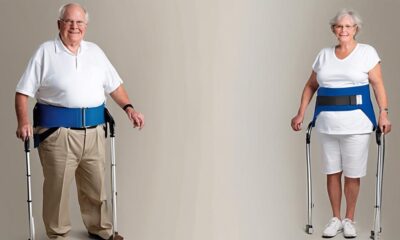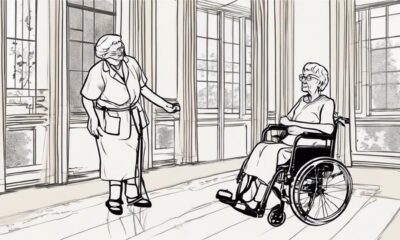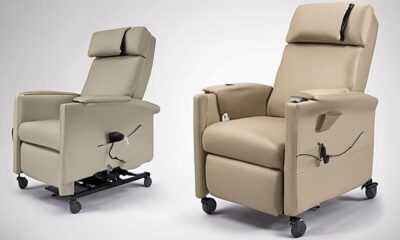Caregiver Support
Managing Hearing Loss for Dementia Prevention
Yearning to reduce your risk of dementia? Discover how managing hearing loss with aids and social engagement can help.

Managing hearing loss is essential for preventing dementia. Using hearing aids can reduce the risk by nearly 50%. They make listening easier and activate neglected brain areas. Improving social communication is important too. Treat hearing loss early with aids to decrease cognitive decline risk. Communication and social engagement are key. Over-the-counter aids are accessible. Get audiologic support for the best help. Early detection matters, so have regular check-ups and screenings. New hearing aid tech improves sound clarity and reduces noise. Healthy habits like good diet and exercise also aid dementia prevention. Learning about managing hearing loss leads to a healthier brain.
Key Takeaways
- Treating hearing loss with aids reduces dementia risk.
- Regular use of aids aids in reducing cognitive decline.
- Enhance social engagement for dementia prevention.
- Seek early detection through regular hearing tests.
- Access audiologic support services for optimal benefits.
The Impact of Hearing Loss on Dementia
Hearing loss greatly raises the risk of developing dementia, with even mild impairment doubling the likelihood and moderate loss tripling it. For older adults, this heightened risk underscores the importance of addressing hearing loss promptly.
Untreated hearing loss not only impacts our ability to hear but can also lead to faster cognitive decline. Changes in the brain due to hearing loss can affect cognitive functions, potentially increasing the risk of developing dementia over time. Additionally, the extra cognitive resources demanded by untreated hearing loss could contribute to cognitive decline.
Social engagement plays a critical role in cognitive health, and decreased interactions due to hearing loss can further exacerbate cognitive issues and the risk of dementia. Recognizing these risk factors and taking proactive steps to address hearing loss, such as seeking professional help, considering hearing aids, and staying socially engaged, are vital to promote cognitive well-being and potentially reduce the risk of developing dementia.
Hearing Aid Benefits for Dementia Prevention

Incorporating hearing aids into daily life can greatly enhance cognitive function and contribute to dementia prevention. Older adults with hearing loss who use hearing aids can reduce their risk of developing dementia by nearly 50%.
Hearing aids help decrease the effort required to listen, allowing the brain to focus on other tasks. By providing auditory stimulation, these devices can activate neglected brain areas affected by hearing loss, potentially improving overall cognitive function.
Improved social communication facilitated by hearing aids may also play an important role in dementia prevention. Seeking a hearing evaluation and discussing treatment options, including the use of hearing aids, is vital for those looking to reduce their risk of cognitive decline and dementia.
Strategies to Manage Hearing Loss
To effectively manage hearing loss, individuals can adopt various strategies that promote auditory health and overall well-being. Addressing hearing loss through interventions such as treating hearing loss with hearing aids is vital for maintaining cognitive health in older adults. Research shows that regular use of properly fitted hearing aids can reduce the risk of cognitive decline by nearly 50%. By improving communication and social engagement, hearing intervention not only enhances auditory abilities but also benefits overall cognitive health, thereby lowering dementia risk.
For those seeking more accessible options, over-the-counter hearing aids offer a convenient and affordable solution for managing hearing loss. However, it's crucial to mention that access to audiologic support services is essential for older adults to fully benefit from these devices. These services provide the necessary guidance and adjustments to ensure that the hearing aids are optimally fitted and functioning, supporting long-term cognitive function and well-being. By embracing these strategies, individuals can proactively manage their hearing health and reduce the risk of cognitive decline associated with untreated hearing loss.
Early Detection of Hearing Loss

Detecting hearing loss early is essential for maintaining cognitive function and preventing dementia. Untreated hearing loss can contribute to faster cognitive decline, impacting overall brain health.
Regular hearing tests play a critical role in the early detection of any potential hearing issues. By addressing hearing loss promptly, individuals may reduce the risk of developing dementia later in life.
Taking proactive steps towards managing hearing loss not only supports brain health but also helps in preserving cognitive function. It's important to prioritize regular check-ups and screenings to identify any changes in hearing ability early on.
Technology Advancements in Hearing Aids
Advanced sound processing and wireless connectivity options are key features of modern hearing aids. These advancements improve the quality of sound amplification and allow for seamless integration with other devices.
Understanding these features can help individuals make informed choices when selecting a hearing aid that suits their needs.
Advanced Sound Processing
In our modern world, hearing aids with advanced sound processing technology are revolutionizing the way individuals experience sound clarity and communication.
These innovative advancements in hearing aids focus on enhancing speech clarity while reducing background noise, making conversations clearer and more understandable. Directional microphones help in noisy environments by pinpointing the sound source, enabling better listening experiences.
Additionally, noise reduction algorithms filter out unwanted sounds, further improving speech understanding. Connectivity features, such as Bluetooth, allow for direct streaming of audio from various devices to the hearing aids, increasing accessibility and convenience.
Wireless Connectivity Options
With the evolution of modern hearing aids, wireless connectivity options have greatly transformed the way individuals interact with sound through seamless integration with smartphones and other devices. Bluetooth technology in hearing aids allows for direct streaming of phone calls, music, and other audio content, enhancing the overall listening experience.
Remote microphone accessories are available to improve speech understanding in challenging environments, providing clarity in conversations. Hearing aid apps offer customization features and control over settings, creating personalized hearing experiences tailored to individual needs.
Additionally, tele-audiology services utilize wireless connectivity for remote adjustments and consultations with audiologists, ensuring ongoing support and care. These advancements in wireless connectivity options not only enhance the functionality of hearing aids but also improve the quality of life for individuals with hearing loss.
Cognitive Benefits of Treating Hearing Loss

Addressing hearing loss through the use of aids provides significant cognitive benefits for older adults at high risk of dementia, reducing cognitive decline by nearly 50%. Research highlights the importance of treating hearing loss in preventing cognitive decline and dementia.
By wearing hearing aids, older adults can experience improved communication abilities and increased social engagement. These cognitive benefits stem from the alleviation of the cognitive load that untreated hearing loss places on the brain, supporting overall brain function.
In addition, early intervention with hearing aids can have lasting positive effects on cognitive function and reduce the risk of developing dementia. Hence, it's essential for individuals experiencing hearing loss to seek assistance through hearing aids to preserve cognitive abilities and potentially lower the risk of dementia.
Embracing the use of hearing aids not only enhances hearing but also nurtures brain health, promoting a better quality of life for older adults.
Lifestyle Changes for Dementia Prevention

Treating hearing loss through aids offers significant cognitive benefits, and now we shift our focus to lifestyle changes essential for dementia prevention. When it comes to reducing the risk of dementia and cognitive decline, incorporating specific lifestyle adjustments can play an important role in maintaining brain health. For older adults looking to safeguard their cognitive abilities, here are some essential lifestyle adjustments to contemplate:
- Engage in regular physical exercise to reduce dementia risk by up to 30%.
- Follow a heart-healthy diet rich in fruits, vegetables, and whole grains to lower the likelihood of developing dementia.
- Manage conditions like high blood pressure, diabetes, and obesity to help decrease the risk of cognitive decline.
- Prioritize quality sleep and effective stress management as significant factors in dementia prevention.
- Stimulate your brain by participating in activities such as puzzles, reading, and learning new skills to lower the risk of developing dementia.
Importance of Regular Hearing Check-ups

Regular hearing check-ups play an important role in maintaining our overall cognitive health.
By identifying hearing issues early on, we can take proactive steps to address them promptly.
These routine screenings can greatly reduce the risk of cognitive decline and dementia in the long run. By identifying potential issues early, individuals can implement effective lifestyle changes that support brain health. In addition, incorporating *dementia wandering prevention strategies* can ensure the safety of those at risk, by minimizing incidents where cognitive decline leads to unsafe wandering behaviors. Together, these proactive measures can significantly enhance quality of life for those facing cognitive challenges. Early interventions, such as managing Lewy body dementia, can not only address specific symptoms but also provide a structured approach to care that optimizes daily functioning. Collaboration between healthcare professionals, caregivers, and families is essential in creating personalized plans that cater to individual needs. By fostering a supportive and informed care environment, those affected can maintain a sense of autonomy and dignity throughout their journey.
Preventive Benefits of Check-Ups
Scheduling routine check-ups with a hearing healthcare professional is important for maintaining peak hearing health and cognitive function. Regular check-ups play a significant role in preventing hearing loss and safeguarding cognitive health. Here are some key benefits of regular check-ups:
- Early Detection: Identifying hearing issues early allows for timely intervention.
- Prevent Further Damage: Routine check-ups can help prevent additional hearing loss.
- Dementia Prevention: Monitoring changes in hearing health is essential for preventing dementia.
- Effective Treatment: Early identification of hearing problems leads to better treatment outcomes.
- Overall Cognitive Health: Regular visits to a hearing healthcare professional support overall cognitive well-being.
Early Detection Advantages
Detecting hearing issues early through regular check-ups is essential for preventing cognitive decline and safeguarding brain health. Regular hearing evaluations play an important role in identifying potential hearing loss, which is a recognized risk factor for dementia in older adults.
By recognizing signs of hearing impairment through early detection, timely interventions can be implemented to mitigate cognitive decline and reduce the risk of developing dementia. These routine screenings help healthcare providers understand the patterns of hearing loss that may contribute to an increased risk of dementia, allowing for appropriate management strategies.
Hence, scheduling and attending routine hearing check-ups are crucial steps for older adults to address any hearing concerns promptly and support overall brain health in the prevention of cognitive decline and dementia.
Addressing Age-Related Hearing Loss

Addressing age-related hearing loss is essential for maintaining quality of life in older individuals. Age-related hearing loss, commonly seen in older adults, can lead to social isolation and cognitive decline if left untreated.
Here are some key points to keep in mind when addressing age-related hearing loss:
- Hearing loss impacts brain health: Untreated hearing loss in older adults is linked to an increased risk of dementia and cognitive decline.
- Symptoms may be subtle: Difficulty hearing high-pitched sounds or understanding speech in noisy environments could indicate age-related hearing loss.
- Take into account social implications: Hearing loss can lead to social isolation, impacting mental well-being and overall quality of life.
- Early detection is essential: Detecting age-related hearing loss early can help prevent further complications and improve outcomes.
- Treatment options are accessible: Hearing aids can greatly improve hearing and communication, enhancing the overall quality of life for older individuals.
Community Resources for Hearing Health
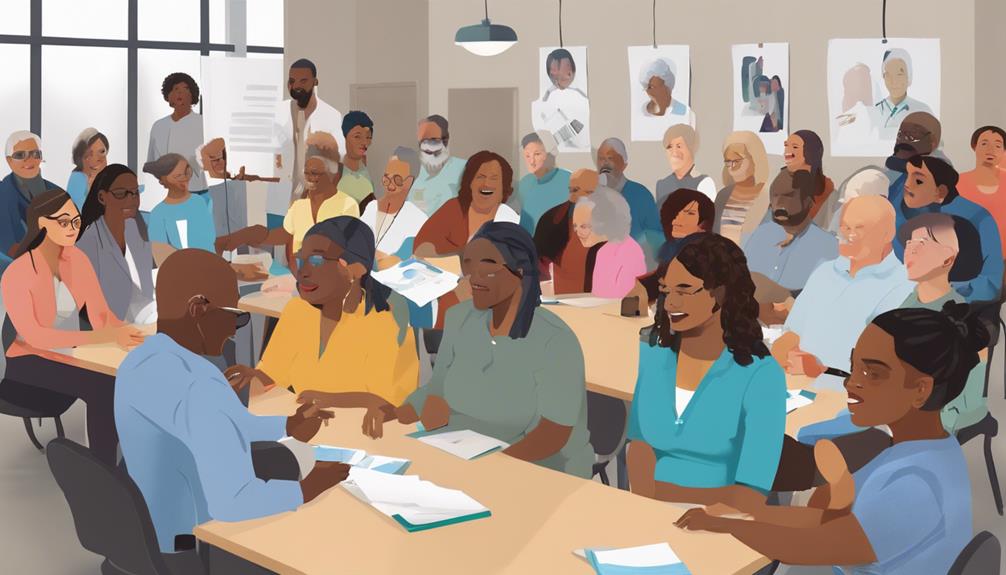
Community resources play a crucial role in promoting hearing health and providing support for individuals with hearing loss. Local clinics and organizations offer free hearing tests to assess hearing abilities and detect any issues early on.
Some community centers host educational workshops focusing on hearing loss and strategies for dementia prevention. Non-profit organizations may extend financial assistance programs to help individuals in need acquire hearing aids.
Support groups within the community create a space for emotional support and practical advice on coping with hearing loss. Additionally, community health fairs often feature booths providing information on hearing health and available resources for assistance.
Frequently Asked Questions
Does Wearing a Hearing Aid Help With Dementia?
Wearing a hearing aid can greatly help with dementia prevention. It reduces cognitive decline by almost 50%, decreases the cognitive load of untreated hearing loss, improves social communication, and stimulates neglected brain areas, potentially preserving cognitive function.
How Can I Prevent Hearing Loss in Old Age?
We can prevent hearing loss in old age by attending regular check-ups, avoiding loud noises, using protection, following healthcare advice on hearing aids, engaging in brain-stimulating activities and social interactions, and maintaining good overall health habits.
How Can I Slow Down My Hearing Loss?
We can slow down hearing loss by wearing aids regularly, avoiding loud noises, seeking early treatment, maintaining a healthy lifestyle, and consulting with audiologists for personalized care. Our commitment to these practices can greatly preserve our hearing.
How Can I Improve My Hearing Power in Old Age?
We can improve our hearing power in old age by engaging in cognitive activities, using hearing aids if needed, protecting our ears from loud noises, seeking professional help early, and maintaining good health habits like a balanced diet and exercise.
Conclusion
To wrap up, managing hearing loss is vital for dementia prevention. As the saying goes, 'an ounce of prevention is worth a pound of cure.'
By addressing hearing loss early, utilizing hearing aids, making lifestyle changes, and seeking regular check-ups, we can take proactive steps to protect our brain health.
Remember, taking care of our hearing now can make a significant impact on our overall cognitive function in the future.
Albert brings a wealth of knowledge and expertise to our writing team. With a background in caregiving and a deep understanding of the challenges faced by caregivers, Albert’s writing resonates with authenticity and empathy. He is committed to delivering high-quality content that empowers and supports caregivers on their journey.
Caregiver Support
How Can Grandmothers Manage Caregiver Burden to Curb Negative Behaviors Affecting Children?
Learn how grandmothers can tackle caregiver burden to prevent negative behaviors in children, starting with prioritizing self-care.
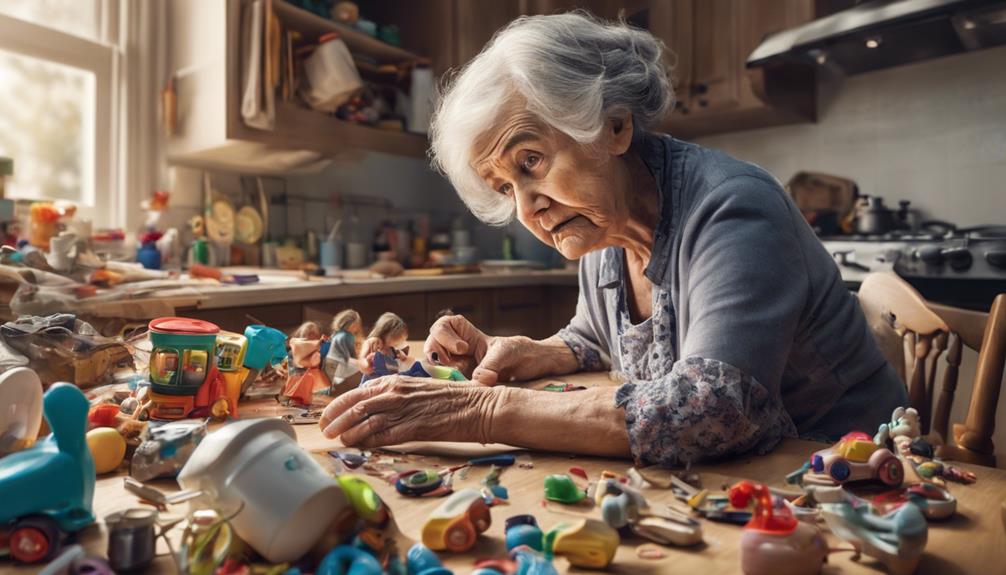
To address the burden faced by caregivers such as grandmothers and ensure that negative behaviors do not impact children, it is essential to make self-care a priority. Participate in activities that bring you joy like hobbies and relaxation techniques to help alleviate stress. Finding a balance between caring for yourself and your loved ones will help prevent negative behaviors. Moreover, involving grandchildren in household chores can help them learn responsibility and alleviate some of the workload. Don’t hesitate to reach out to friends, family, or support groups for companionship and assistance to avoid feeling isolated. Consider joining caregiver support groups for practical advice and emotional support. Remember, creating a nurturing environment for children begins with taking care of your own well-being first. Give it a shot and notice the positive changes in your family dynamics.
Key Takeaways
- Prioritize self-care activities to reduce stress and improve well-being.
- Seek support from family, friends, or support groups to lessen isolation.
- Engage grandchildren in household tasks to promote responsibility and bond.
- Join caregiver support groups for emotional support and practical advice.
- Express emotions and provide consistent attention to foster a secure and loving environment.
Importance of Self-Care for Grandmothers
Engaging in self-care activities is vital for grandmothers to effectively manage caregiver burden and prioritize their well-being. Taking time for self-care allows grandmothers to reduce stress, improve mental and physical health, and ultimately provide better care for their grandchildren.
Activities such as engaging in hobbies, practicing relaxation techniques, and seeking support through therapy or support groups can offer emotional support and coping strategies. By balancing self-care with caregiving responsibilities, grandmothers can prevent negative behaviors that may affect the children they're raising.
It's essential for grandmothers to prioritize their own well-being in order to continue serving their families with love and strength. Remember, taking care of oneself isn't selfish but necessary for maintaining a healthy and sustainable caregiving role.
Seek out opportunities for self-care and support to guarantee a fulfilling and balanced life as a grandmother.
Strategies to Reduce Caregiver Stress

To diminish caregiver stress, it's vital to engage in stress management techniques like deep breathing, mindfulness, and meditation.
Seeking support from family, friends, or support groups can help reduce feelings of isolation and provide emotional relief.
Prioritizing self-care activities such as exercise, sleep, and healthy eating is key to maintain physical and mental well-being.
Stress Management Techniques
Implementing stress management techniques such as deep breathing exercises and mindfulness can greatly reduce caregiver stress for grandmothers.
Engaging in physical activities like walking or yoga can also help alleviate stress and enhance overall well-being.
Seeking social support from friends, family, or support groups provides opportunities to share caregiving experiences and feelings.
Additionally, practicing self-care activities such as taking breaks, getting enough rest, and pursuing personal interests is essential in preventing burnout.
When emotional challenges become overwhelming, considering professional help through therapy or counseling can assist grandmothers in coping with the demands of caregiving and managing negative behaviors that may arise.
Self-Care Practices
When it comes to managing caregiver burden for grandmothers, exploring self-care practices is key to reducing stress and maintaining well-being. Here are some effective strategies to help grandmothers alleviate caregiver stress and prioritize their own well-being:
- Engage in regular physical activity, like walking or yoga, to reduce stress and boost overall well-being.
- Practice mindfulness techniques such as meditation or deep breathing exercises to cope with caregiver burden more effectively.
- Seek social support from friends, support groups, or counselors to find emotional outlets and practical advice.
Involving Grandchildren in Household Tasks
When it comes to managing household tasks, involving grandchildren can be beneficial for everyone. It fosters a sense of responsibility and achievement in the younger ones while also teaching them valuable life skills.
Additionally, working together on chores like cooking, cleaning, or gardening can strengthen the bond between grandparents and grandchildren.
Sharing Household Responsibilities
Engaging grandchildren in household tasks not only fosters a sense of responsibility but also strengthens intergenerational bonds and promotes valuable life skills. Sharing household responsibilities is a wonderful way to cultivate a cooperative family environment. Here are some benefits of involving children in chores:
- Promoting Independence: By participating in tasks, children learn to be self-reliant and capable.
- Boosting Self-Esteem: Completing chores successfully can enhance children's confidence and belief in their abilities.
- Alleviating Caregiving Burden: Sharing responsibilities with grandchildren can help grandmothers manage their caregiving duties more effectively, creating a harmonious family dynamic.
Encouraging your grandchildren to contribute to household tasks not only benefits them but also strengthens family bonds and fosters a sense of unity.
Teaching Life Skills
To equip grandchildren with essential life skills, involving them in household tasks not only promotes independence and self-esteem but also strengthens familial bonds and fosters a sense of unity. Assigning age-appropriate chores teaches responsibility, instills self-discipline, and hones time management abilities.
As grandchildren participate in tasks like setting the table, folding laundry, or watering plants, they learn the value of contributing to the household. This shared responsibility creates a bond between generations, fostering teamwork and collaboration. Working together towards a common goal, whether it's cleaning up after a meal or organizing a shared space, can enhance the sense of belonging and cooperation within the family unit.
These experiences help grandchildren develop important life skills that will serve them well in the future.
Seeking Support From Others

Seeking support from others is essential for grandmothers in managing caregiver burden as it provides emotional assistance and practical advice to alleviate stress. When grandmothers feel overwhelmed by the responsibilities of caregiving, reaching out for help can make a significant difference. Here are some ways in which seeking support from others can benefit grandmothers:
- Emotional Assistance: Talking to friends, family members, or counselors can offer a listening ear and understanding, helping grandmothers navigate their feelings of stress and exhaustion.
- Practical Advice: Support groups and social networks can provide valuable insights and coping strategies for dealing with the challenges of caregiving, offering new perspectives and solutions to common problems.
- Shared Experiences: Connecting with other grandmothers who are also raising grandchildren can create a sense of community and solidarity. Sharing experiences and tips with peers facing similar situations can reduce feelings of isolation and empower grandmothers in their caregiving role.
Joining Caregiver Support Groups

Joining caregiver support groups can provide grandmothers with valuable emotional support, understanding, and practical advice in managing caregiver burden. These groups create a sense of community where grandmothers can share experiences, coping mechanisms, and strategies with others facing similar challenges.
By engaging with other caregivers, feelings of isolation can diminish, leaving grandmothers feeling more empowered and capable in their caregiving roles. Support groups not only offer a safe space for sharing but also provide access to important resources, information, and referrals to services that can aid grandmothers in overcoming the obstacles they encounter.
Participating in caregiver support groups can enhance well-being, resilience, and the ability to create a stable and nurturing environment for grandchildren. By joining these groups, grandmothers can find strength in unity, gain valuable insights, and work towards reducing the negative impacts of caregiver burden on both themselves and the children they care for.
Creating a Nurturing Environment for Children

Engaging with caregiver support groups can equip grandmothers with the tools and insights needed to create a nurturing environment for the children under their care. These groups offer a collaborative space for sharing experiences, learning practical strategies, and addressing common challenges. By empowering family caregivers, grandmothers can build confidence in their roles, ensuring the emotional and physical well-being of the children they are raising. Additionally, these support networks often provide access to valuable resources and community connections that further strengthen the caregiving experience.
When grandmothers establish consistent routines and clear rules, they provide a stable and predictable atmosphere that promotes positive behaviors in children.
Encouraging open communication and emotional expression fosters a supportive environment where children feel heard and understood, reducing the impact of caregiver burden on their behavior.
Additionally, offering consistent attention and affection to grandchildren helps create a sense of security and well-being, diminishing the likelihood of behavioral issues.
Frequently Asked Questions
What Can Grandparents Do to Lessen the Stress of Raising Their Grandchildren?
To lessen the stress of raising grandchildren, we can engage in self-care, seek social support, utilize community resources, set boundaries, and communicate with parents. These actions help us manage caregiver burden and create a positive environment for the children.
What Are the Emotional and Physical Effects of Grandparents Becoming Primary Caregivers for Their Grandchildren?
Experiencing high levels of caregiver burden, we face emotional and physical strain. Stress, depression, fatigue, and isolation are common. Prioritizing self-care is essential to maintain well-being, positively impacting both us and the children we care for.
What Is the Most Prominent Mental Health Problem Associated With Grandparents Raising Grandchildren?
Depression is the most prominent mental health challenge for grandparents raising grandchildren. It affects their ability to cope with the caregiver burden. Support and resources are crucial to help manage depression and improve outcomes for both generations.
How Do You Deal With Overly Involved Grandparents?
Dealing with overly involved grandparents involves setting boundaries, having honest conversations, and encouraging self-care. Seek support from family or professionals. Allow them positive involvement while respecting primary caregivers' roles. Balance is key for everyone's well-being.
Conclusion
To wrap up, by taking care of ourselves as grandmothers, we can better care for our grandchildren. Just as a well-tended garden flourishes, so too can our relationships with our grandchildren grow and thrive when we prioritize our own well-being.
Remember, just like a plant needs water and sunlight to flourish, we need self-care and support to provide the best care for our little ones. Let's nurture ourselves so we can continue to nurture our grandchildren with love and strength.
Albert brings a wealth of knowledge and expertise to our writing team. With a background in caregiving and a deep understanding of the challenges faced by caregivers, Albert’s writing resonates with authenticity and empathy. He is committed to delivering high-quality content that empowers and supports caregivers on their journey.
Caregiver Support
Honoring Our Heroes on Veterans Day: A Guide to Thanking Veterans
Discover meaningful ways to honor veterans on Veterans Day, leaving a lasting impact on those who served – the guide awaits!

To show appreciation for veterans on Veterans Day, there are various ways we can express our gratitude. One way is to write letters thanking them for their service. Another is to participate in local events and parades to demonstrate support. Visiting Veterans Homes or Hospitals is also a meaningful gesture to show that we care. Listening to a Veteran Speaker can provide further insight and understanding. Observing a moment of silence at 11:00 AM on November 11th is another way to honor their service. These small acts of kindness hold great importance to those who have served. There are countless other ways to show gratitude, and each action contributes to showing veterans that we value and appreciate their sacrifices. There are endless possibilities to honor our heroes on this special day.
Key Takeaways
- Write personalized letters expressing gratitude for veterans' service
- Participate in local Veterans Day events and parades
- Visit Veterans Homes or Hospitals to show unwavering support
- Host a Veteran Speaker for firsthand accounts
- Observe a moment of silence at 11:00 AM on November 11th
Ways to Express Gratitude
How can we best show our appreciation for veterans on Veterans Day?
One meaningful way to honor American veterans is by writing personalized letters expressing gratitude for their service. Taking the time to craft a heartfelt message can make a significant impact on a veteran's day and let them know that their sacrifices are valued.
Another way to show appreciation is by actively participating in local Veterans Day events and parades. By attending these gatherings, we not only pay tribute to the brave individuals who've served our country but also demonstrate our support for them.
Visiting Veterans Homes or Hospitals is another powerful gesture, allowing us to directly thank veterans in our community and show our unwavering support.
Hosting a Veteran Speaker can also be a meaningful way to honor veterans on this special day. By listening to their stories and firsthand experiences, we gain a deeper understanding of the importance of recognizing and appreciating the service of veterans.
Additionally, observing a moment of silence at 11:00 AM on November 11th is a simple yet profound way to pay respect to veterans and acknowledge the sacrifices they've made for our country.
Meaningful Gestures and Actions

To truly honor veterans on Veterans Day, engaging in meaningful gestures and actions is essential.
One impactful way to pay tribute is by hosting a Veteran Speaker. These speakers provide firsthand accounts of their experiences, offering valuable insights into the sacrifices made by veterans.
Another meaningful gesture is visiting a Veterans Home or Hospital. Showing appreciation and support for veterans in need can make a significant difference in their lives. These personal visits can offer comfort and companionship to those who have served, many of whom may be feeling isolated or facing significant health challenges. Additionally, for veterans going through the transitioning process in hospice care, a kind word or gesture can make their final days more peaceful and filled with a sense of dignity. Your presence not only honors their sacrifices but also provides much-needed emotional support during this delicate stage of life.
Participating in Local Parades or Events on Veterans Day is also a powerful way to demonstrate solidarity and honor for all veterans.
Additionally, writing Letters of Thanks to veterans is a thoughtful gesture that acknowledges their service and sacrifices.
Finally, observing a Moment of Silence at 11:00 AM on November 11th is a simple yet profound way to honor veterans and recognize their contributions to our country.
Community Events and Initiatives
Community events and initiatives play a crucial role in fostering a sense of unity and appreciation for veterans within our society. These gatherings provide opportunities for communities to come together and express gratitude for the service and sacrifices of American veterans.
Events like the Corvettes and Veterans at War Memorial Stadium commemorate important milestones in our military history, such as the 75th Anniversary of the stadium, through unique and engaging activities like parades and exhibitions. Museums like the Jacksonville Museum of Military History and the MacArthur Museum of Arkansas Military History offer visitors a chance for remembrance and reflection on the significant moments in our nation's past.
Additionally, initiatives like the Little Rock Military History Tour showcase a city's dedication to honoring our heroes by highlighting various sites related to different branches of the military. By participating in these events and supporting these initiatives, we can guarantee that the legacy of our veterans is preserved and that their contributions are never forgotten.
Supporting Veteran-Owned Businesses

Pivoting from our discussion on community events and initiatives, let's now explore the impact of supporting veteran-owned businesses in our society. Veteran-owned businesses play an important role in our economy and in the lives of those who've served in the armed forces.
Here are some reasons why supporting these businesses is vital:
- History: Veteran-owned businesses have a rich history in American entrepreneurship, dating back to the early days of our nation.
- Served in the Armed Forces: These entrepreneurs have served our country in the Armed Forces, bringing unique perspectives and skills to their businesses.
- Welcome Home: By supporting veteran-owned businesses, we can create a welcoming environment for veterans moving to civilian life.
- Armed Forces: These businesses often reflect the values and dedication instilled by military service, offering exceptional products and services.
Supporting veteran-owned businesses not only helps our economy thrive but also honors the sacrifices and contributions of those who've served our country.
Volunteering Opportunities
Engage with local veterans' organizations or VA hospitals by offering your support and assistance through volunteering opportunities. It's a great way to give back to those who have served our country bravely. By volunteering, you can make a meaningful impact in the lives of these brave men and women in your community. Here are some ways you can volunteer to support veterans:
| Volunteer Opportunities | Description |
|---|---|
| Organize Veterans Day events | Help plan and execute events to honor veterans. |
| Assist with job training | Offer your skills to help veterans in job training. |
| Join service projects | Participate in initiatives to aid veterans in need. |
| Provide companionship | Visit homebound or hospitalized veterans for support. |
| Mentorship programs | Offer guidance and support to veterans. |
Volunteering is a wonderful way to show appreciation for those who have served and sacrificed for our country. Get involved in your community and make a difference in the lives of our veterans.
Educating Others on Veteran Appreciation

To foster a deeper understanding of veteran appreciation, we emphasize the importance of educating others on the distinct significance of Veterans Day and Memorial Day.
- Highlighting Ways to Honor Veterans: Hosting veteran speakers, visiting veterans' homes or hospitals, and participating in parades or events are meaningful gestures to show appreciation.
- Providing Educational Resources: Utilizing tools like the Veterans Day Teacher Resource Guide and free lessons can help teach others about honoring veterans.
- Understanding History and Purpose: Learning about the history and purpose of Veterans Day can deepen one's appreciation and respect for the sacrifices made by veterans.
- Inspiring Gratitude and Support: Educating others on veteran appreciation can inspire gratitude and support for those who've bravely served our country.
Frequently Asked Questions
What Do You Say to Honor Veterans on Veterans Day?
To honor veterans on Veterans Day, we express gratitude by saying 'Thank you for your service' and acknowledging their sacrifices. Words like 'Your dedication to our country is appreciated' and 'Your courage and commitment inspire us all' convey respect.
How Do We Honor Veterans on Veterans Day?
We honor veterans on Veterans Day by participating in events, visiting Veterans Homes or Hospitals, hosting Veteran Speakers, writing thank you letters, and observing a moment of silence at 11:00 AM on November 11th.
What Is a Good Quote for Veterans Day?
We believe a good quote for Veterans Day should capture gratitude, respect, and honor for those who served. It must reflect themes like bravery, sacrifice, and patriotism, evoking pride and unity in acknowledging veterans' contributions.
How Can We Show Veterans That We Are Thankful?
We can show veterans our gratitude by hosting a Veteran Speaker, visiting Veterans Homes, joining Parades, writing Letters of Thanks, and observing a Moment of Silence on November 11th. These actions directly honor their service and sacrifice.
Conclusion
So, as you can see, there are many ways to show our gratitude to veterans on Veterans Day. Whether it's a simple thank you, attending a community event, supporting veteran-owned businesses, or volunteering your time, every gesture counts.
Let's make sure to honor and thank our heroes for their service and sacrifices. Remember, a little appreciation goes a long way in showing our respect and admiration for those who've served our country.
Albert brings a wealth of knowledge and expertise to our writing team. With a background in caregiving and a deep understanding of the challenges faced by caregivers, Albert’s writing resonates with authenticity and empathy. He is committed to delivering high-quality content that empowers and supports caregivers on their journey.
Caregiver Support
Top 10 Long Distance Caregiver Tips for Success
Kickstart your long-distance caregiving journey with these top 10 tips for success to ensure quality care and peace of mind.

In long-distance caregiving, we must use effective communication strategies like setting specific times for calls and video chats. Building a strong care team involves assigning roles and providing regular updates. Utilize technology for remote support by using monitoring devices and scheduling telehealth options. Seek community resources for help and explore respite care services for relief. Guarantee quality care professionals by thoroughly evaluating their qualifications. Prioritize self-care by setting boundaries and seeking support. Create a support system early on for reduced stress levels. Stay connected through regular communication and virtual visits. Taking care of both caregiver and recipient is essential for success. Mastering these tips is vital!
Key Takeaways
- Establish regular communication schedules with family and local caregivers.
- Utilize technology like teleconferences for virtual check-ins.
- Build a strong care team with clear roles and responsibilities.
- Utilize remote monitoring devices for real-time health updates.
- Seek community resources for additional support and assistance.
Effective Communication Strategies
To guarantee smooth coordination and updates on our loved one's well-being, establishing regular communication schedules is vital when caregiving from a distance. As caregivers, our communication responsibilities play an essential role in ensuring the best care for our loved ones. By setting up specific times for calls, video chats, or even just quick check-in messages, we can stay informed about any changes in their health or needs.
Utilizing technology like teleconferences can also aid in discussing care plans effectively with family members and local caregivers. These communication schedules not only help us stay organized but also foster a sense of teamwork and support among everyone involved in the caregiving process.
Building a Strong Care Team

When constructing a robust care team, it's essential to establish clear team communication strategies to make sure everyone is on the same page.
Assigning specific roles and responsibilities to each member helps streamline tasks and avoid confusion.
Team Communication Strategies
Building a strong care team involves establishing clear roles for each member and effectively delegating tasks as needed. Communication is key in making certain everyone is on the same page. Utilizing technology can aid in staying connected and informed. Below is a table outlining some team communication strategies:
| Strategy | Description | Benefit |
|---|---|---|
| Regular Updates | Provide frequent progress reports to keep everyone informed. | Guarantees transparency and accountability. |
| Virtual Check-Ins | Schedule video calls to discuss important matters and check on your loved one. | Facilitates face-to-face communication regardless of distance. |
| Communication Apps | Use apps for instant messaging and updates on the go. | Allows quick and efficient sharing of information. |
Roles and Responsibilities
Establishing specific roles and responsibilities for each team member is vital in building a strong care team. When each member knows their tasks, caregiving becomes more efficient and supportive. By assigning roles, the workload is shared, ensuring all aspects of care are addressed.
Communication within the care team is essential for coordination and effective caregiving. Clear communication helps everyone understand their responsibilities and fosters teamwork. A well-organized care team can offer better support and enhance the overall caregiving experience.
Assigning roles and responsibilities within the care team creates a structured approach to caregiving, leading to improved outcomes. Effective communication and clear delineation of responsibilities are key to a successful care team.
Utilizing Technology for Remote Support
Utilizing technology plays a crucial role in enabling long-distance caregivers like us to stay connected and monitor the well-being of our loved ones remotely. Here are three ways technology can enhance remote support for caregiving:
- Remote Monitoring Devices: These devices provide real-time updates on the health and activities of our loved ones. From tracking vitals to movement patterns, these tools offer valuable insights into the care recipient's well-being.
- Communication Apps: Utilizing communication apps allows for instant contact and updates. Video calls offer face-to-face interaction, providing visual reassurance and strengthening the emotional bond despite the physical distance.
- Telehealth Options: Caregivers can schedule medical consultations for their loved ones through telehealth services, eliminating the need to be physically present. This technology guarantees that our care recipients receive timely medical attention and care, even from afar.
Seeking Community Resources

To further support our caregiving journey from a distance, we can tap into various community resources that offer assistance and guidance. Contacting local aging agencies, such as Area Agencies on Aging, can provide valuable information on available community resources and support programs tailored to the needs of caregivers and their loved ones.
Attending caregiver support groups or workshops is another beneficial way to connect with individuals facing similar challenges and gain insights into effective caregiving strategies. Additionally, exploring respite care services can offer temporary relief for caregivers, allowing them to take much-needed breaks and recharge.
Inquiring about meal delivery services and transportation assistance can help meet the practical needs of the care recipient, ensuring their well-being. Visiting senior centers can also be advantageous, as they often provide social engagement opportunities like classes, activities, and events specifically designed for older adults.
Ensuring Quality Care Professionals

When seeking high-quality care professionals, it's vital to thoroughly evaluate their qualifications. Conducting interviews with caregiver candidates enables us to assess their skills and suitability for our loved one's requirements.
Verifying that the caregivers' credentials and experience align with our expectations is paramount for delivering exceptional care from a distance.
Screening Caregiver Qualifications
We prioritize verifying the credentials and experience of care managers to guarantee they meet the necessary qualifications for providing quality care. When screening caregiver qualifications, consider the following:
- Evaluate Credentials: Check for relevant certifications and licenses held by the care manager, ensuring they've the necessary training to care for your loved one.
- Assess Experience: Inquire about the care manager's previous work experience and specialties to determine their expertise in handling your loved one's specific needs.
- Seek Recommendations: Ask for references or reviews from past clients to gain insight into the care manager's reputation and the quality of care they provide.
Interviewing Caregiver Candidates
After screening caregiver qualifications, the next step is to engage in thorough interviews with potential candidates to guarantee we secure quality care professionals for our loved ones.
When interviewing caregiver candidates, it's essential to verify their credentials and experience to make sure they can provide the level of care needed. Discuss their availability and expertise to assess if they align with the specific care requirements.
Remember that Medicare and most health insurance plans typically don't cover care management services, so consider the costs associated with hiring a reputable caregiving professional.
Make your hiring decision carefully, ensuring that the selected care manager not only meets but also exceeds the specific needs and preferences of your loved one.
Prioritizing Self-Care

Prioritizing self-care as long-distance caregivers involves consciously dedicating time and effort towards maintaining personal well-being to prevent burnout and guarantee effective caregiving.
To make sure you're caring for yourself while supporting your loved one, consider the following key practices:
- Taking Breaks: Schedule regular breaks to rest and recharge, allowing yourself time to relax and rejuvenate.
- Setting Boundaries: Establish clear boundaries between your caregiving responsibilities and personal life to prevent feelings of overwhelm and exhaustion.
- Seeking Support: Reach out to friends, family, or support groups for emotional assistance and guidance, recognizing that it's okay to ask for help.
Engaging in these self-care strategies can't only enhance your own well-being but also positively impact the quality of care you provide to your loved one.
Creating a Support System

To guarantee effective caregiving and maintain personal well-being, establishing a strong support system is essential for long-distance caregivers. Research has shown that caregivers who've a support network in place experience reduced stress levels and achieve better outcomes for their loved ones.
Engaging with support groups and community resources can greatly improve the mental well-being of long-distance caregivers, equipping them with the tools to handle the challenges they may face. By delegating tasks to their support system, caregivers can combat feelings of isolation and burnout, ultimately enhancing the quality of care provided to their loved ones.
It's vital to establish a support system early on in the caregiving journey to effectively manage responsibilities and prevent caregiver strain. Having a support system not only helps caregivers feel more connected and informed about their loved one's well-being but also enables them to navigate the complexities of long-distance caregiving with greater ease.
Staying Connected

Regular communication with the care recipient and local caregivers is essential for maintaining strong connections when caregiving from afar.
By utilizing technology like video calls and messaging apps, we can bridge the physical distance and stay updated on our loved one's well-being.
Setting up regular virtual visits not only provides emotional support but also helps us feel present in their daily lives.
Regular Video Calls
Implementing frequent video calls is essential for long-distance caregivers to maintain a strong connection with their loved ones and actively monitor their well-being. Video calls offer a unique opportunity to visually assess the care recipient's condition and provide support from a distance.
Here are some benefits of regular video calls for long-distance caregivers:
- Visual Observation: Allows for monitoring changes in appearance, behavior, and living conditions.
- Remote Participation: Enables involvement in medical appointments, care planning, and issue resolution.
- Emotional Support: Provides a personal and interactive way to offer companionship, reassurance, and emotional connection.
Regular video calls can bridge the physical distance between caregivers and their loved ones, fostering a sense of closeness and ensuring effective caregiving.
Utilize Online Resources
How can long-distance caregivers effectively stay connected and access valuable support resources for their caregiving responsibilities? Caregiving websites offer a wealth of information on health conditions, care options, legal matters, and financial planning, aiding in informed decision-making.
Telehealth services allow caregivers to remotely consult healthcare providers, ensuring their loved ones receive necessary medical attention.
Social media platforms provide a sense of community, connecting caregivers with others facing similar challenges and fostering a supportive environment.
Utilizing online communication tools like video calls, messaging apps, and email enables caregivers to maintain close contact with their loved ones and care team, bridging the distance and ensuring efficient coordination of care.
Taking Care of Caregiver and Recipient

To guarantee the well-being of both the caregiver and the care recipient, prioritizing self-care and maintaining open communication is essential for long-distance caregiving. Here are some key ways to take care of both the caregiver and the recipient:
- Family Support: Involving other family members in the caregiving process can provide much-needed assistance and emotional support. Sharing responsibilities among family members can lighten the load on the primary caregiver and make sure the recipient receives thorough care.
- Self-Care Practices: Carving out time for self-care activities, such as exercise, relaxation techniques, and hobbies, is critical for the caregiver's physical and mental well-being. Taking care of oneself enables the caregiver to continue providing quality care to the recipient without experiencing burnout.
- Open Communication: Regular and honest communication with the care recipient is essential for maintaining a strong and trusting relationship. Discussing any concerns, needs, or changes in care openly can help address issues promptly and safeguard the well-being of both parties.
Essential Aspects of Successful Caregiving

Coordinating care effectively begins with creating a detailed care plan in advance. A care plan outlines the specific needs of the care recipient, schedules for medication, doctor's appointments, and other essential tasks. It serves as a roadmap for caregivers to follow, guaranteeing nothing is overlooked.
Recognizing red flags that indicate the need for in-home care is essential. Changes in the care recipient's behavior, unexplained bruises, or sudden weight loss could signal the necessity for additional assistance.
Discussing caregiving responsibilities with family members allows for effective delegation of tasks and the sharing of the caregiving burden.
In Distance Caregiving, having a support network in place is critical. Regular check-ins with the care recipient and healthcare providers help monitor well-being from afar.
Understanding the signs of elder abuse and taking preventive measures is also necessary. By staying informed and proactive, caregivers can safeguard the safety and well-being of their loved ones.
Frequently Asked Questions
How Can I Be a Good Caregiver to a Little Long Distance?
We stay connected through regular communication, utilizing technology for strong bonds. Coordinating with local caregivers and providers guarantees thorough care. Strategically planning visits maximizes quality time. Prioritizing self-care prevents burnout, allowing effective support from afar.
How Can I Help a Long Distance Caregiver?
We provide support through regular communication, help with research on local resources, coordinate visits, stay updated on health information, aid in creating care plans, organize documents, and establish emergency protocols. Let's collaborate to guarantee efficient caregiving from a distance.
What Is Your Strongest Skill as a Caregiver?
Our strongest skill as caregivers is effective communication. We listen attentively, convey empathy, and guarantee clarity in our interactions. This skill allows us to connect deeply with those we care for, fostering trust and understanding in our relationships.
How Do I Become a Successful Caregiver?
We become successful caregivers by prioritizing communication, self-care, technology, community resources, and quality care. Staying informed, preventing burnout, and utilizing support services help us provide effective care and safeguard the well-being of our loved ones.
Conclusion
To sum up, looking after a loved one from a distance can be challenging, but with the right strategies in place, it's possible to provide quality care and support.
By utilizing communication tools, building a strong care team, and staying connected, long distance caregiving can be made easier and more effective.
Remember to prioritize self-care, seek community resources, and guarantee the well-being of both the caregiver and recipient.
With these tips in mind, you can successfully navigate the complexities of long distance caregiving.
Albert brings a wealth of knowledge and expertise to our writing team. With a background in caregiving and a deep understanding of the challenges faced by caregivers, Albert’s writing resonates with authenticity and empathy. He is committed to delivering high-quality content that empowers and supports caregivers on their journey.
-

 Dementia Care3 weeks ago
Dementia Care3 weeks agoUnderstanding the Stages of Vascular Dementia: A Visual Chart Guide
-

 Dementia Care4 weeks ago
Dementia Care4 weeks agoHow Gabapentin Affects Dementia: A Comprehensive Guide
-

 Dementia Care3 weeks ago
Dementia Care3 weeks ago10 Engaging Dementia Games for Cognitive Stimulation
-

 Dementia Care4 weeks ago
Dementia Care4 weeks ago5 Things You Need to Know About Jack Nicholson’s Dementia
-

 Dementia Care2 weeks ago
Dementia Care2 weeks agoUnderstanding Narcissism and Dementia: A How-To Guide
-

 Dementia Care2 weeks ago
Dementia Care2 weeks agoDavid Suchet’s Wife Opens Up About Living with Dementia
-

 Dementia Care2 weeks ago
Dementia Care2 weeks agoHow to Deal with a Parent’s Dementia: A Practical Guide
-

 Dementia Care2 weeks ago
Dementia Care2 weeks agoUnderstanding the Link Between Ambien and Dementia: A How-To Guide
